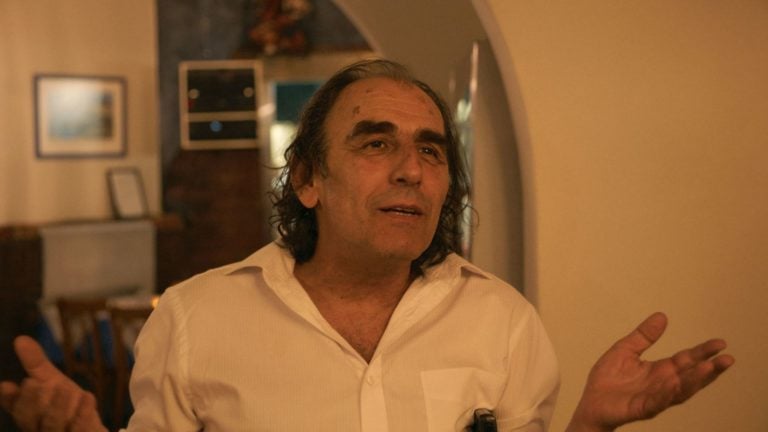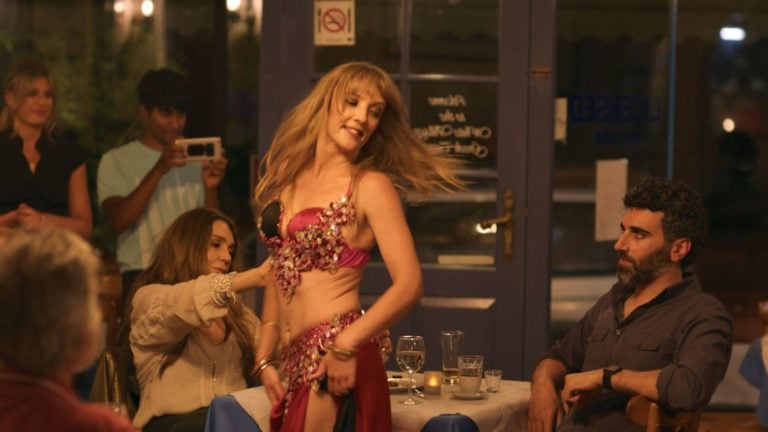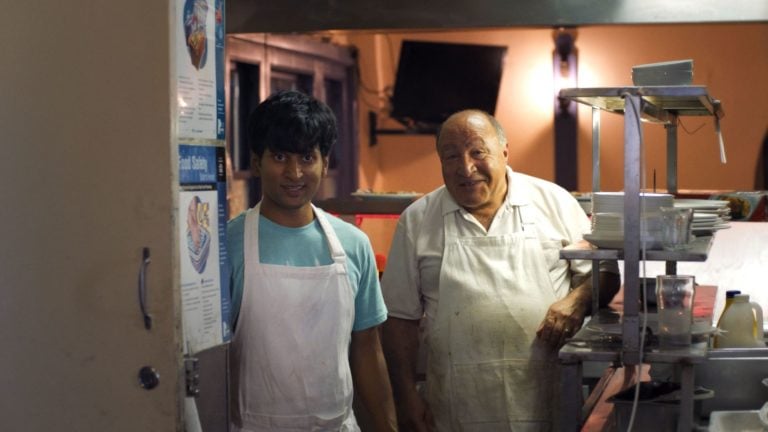Ask any person of Greek background for memories linked to a taverna outing, and chances are you will hear at least one story reminiscent of a family or otherwise intimate environment.
For the creator of the cinematic Taverna, Alkinos Tsilimidos, this concept has been central to the making of the black comedy.
In fact, as the Greek Australian points out in the director’s statement, this is his probably his “most personal film.”
“From my earliest recollections the experience of eating in Greek restaurants in Melbourne made me feel Greek. The food, the drama, the language, and the fun led to an overwhelming feeling of belonging,” he said.
With this in mind, the premiere’s warm reception at the Greek Film Festival a few months ago was no big surprise. Following the pandemic-induced closure of cinemas, the film is now set to hit screens nationally on Thursday 2 July.
On the occasion of its upcoming introduction to a wider audience, Neos Kosmos spoke with acclaimed Greek actor Vangelis Mourikis, who plays the role of restaurant owner Kostas, and explains why the taverna was the ideal setting for bringing forward the diverse human stories of the movie.
ALSO READ: No need to be Greek to enjoy ‘The Taverna’, but if you are – even better
Meet tavern owner Kosta
“Hospitality venues in particular, where people sit down to eat, calm and relaxed, is where you’d see a gathering featuring different cultures,” Mr Mourikis said, adding later on in the conversation that this meeting of diversity within a place like the tavern essentially brings people together.

The common ground, he explains, is simply food, the centric component in an atmosphere that reminds him of Hestia, the goddess of the family hearth in Greek mythology.
In taverna’s case, the person managing the ins and outs of the intimate business environment is restaurant owner Kostas.
“I didn’t base my character on a specific real-life person, because the role was written so well by Tsilimidos,” Mr Mourikis explained.
“The truth is anybody would want to get involved in a role like this, a protagonist being the centre of attention in his own space, being somehow in charge of everyone, like an orchestra conductor, a captain who is sort of leading the way.”
ALSO READ: Support Greek Melbourne restaurants offering fine dining
But what happens when the person tasked with running the ‘show’ encounters unexpected mishaps?
“There comes the point where he is also taken by surprise in the face of all that’s happening, with the character becoming even more intriguing,” Mr Mourikis said, referring to an explosive chain of events that jeopardise the harmony surrounding the intimate atmosphere.
“In the movie, we see Kosta testing the limits of a ‘system’ defined by the Taverna. Meaning, something looks like it’s not working? That’s OK, it will work in a different way. And he risks everything in a bid to stick to his identity and old habits,” he says noting that this experimentation with boundaries is what sets the comedy in motion.
The plot promises an intersection between the comic and the dramatic, with the tavern owner called to respond to multiple crises kickstarted after the restaurant’s belly dancer refuses to perform her popular act.

An eager waitress offers to step in to replace her, a sleazy customer comes in the mix, as well as a kidnapping incident and a scooter accident followed by a family cover-up. It won’t be long before authorities have to intervene…
Personal stories and past experiences blend in with dilemmas faced by the characters, all fitting in a darkly comic night for which the adjective action-packed would probably be an understatement.
Making a comeback in Melbourne
According to Mr Mourikis, one of the main themes standing out from the film is the concept of ‘substitution’ championed by the characters.
“Everything is substituted by something else. It is the same but yet again different. [This encompasses] language, culture, [the concept of] homeland, professions, down to the substitution of a ‘guilty person’ in the plot with someone else. And all this of course is done in a comic way giving a unique dynamic to the concept of ‘substitution’,” he said.
Director Tsilimidos is also adamant “this was to become the central theme of the movie”, the fact that characters “had to either face certain realities in their lives to enact change or be destined to live in some sort of delusion.”
“For me, this is what gives it a modern, contemporary take by Tsilimidos that we as actors are called to incorporate in the roles,” Mr Mourikis said.

Mr Tsilimidos and Mr Mourikis enjoy a years’-long friendship, since the time the latter was studying and working as an actor in Melbourne in the ’80s.
The spirit of collaboration and community amidst cast members and collaborators of The Taverna, Mr Mourikis says, has awakened memories of that past.
He paints the picture of a multicultural working environment, where each artist would bring diverse offerings in a common endeavour.
ALSO READ: 10 interesting Greeks in Australia’s global creative industry
“Theatre-making here as well, from what I can recall, had those attributes. I don’t know exactly how it is done here today, but [back then] we were saying ‘we’ll do this’ and you would become part of the project, of an endeavour […] You would become creative within a specific space, at a certain point in time for a topic at hand. You essentially belong where you are and strive to create in whatever way you can, as this fosters a greater sense of belonging and something good might come out of it in the end either way,” he said.
Mr Mourikis’ description of The Taverna’s making, with the film shot in a mere 16 days at an actual Melbourne restaurant, sounds pretty similar to that recollection.
“The limited time within which shootings took place is not that important, what matters is that the film has come out there with a really good foundation and all that time we worked together had those attributes, we were all in it together.
“People were open, easy to collaborate with, and the surrounding atmosphere was exactly like what one wants to work on a film.
Honestly, I have only good things to say about this ‘trip’ and my co-workers[…]it is an endeavour I find to be so full of emotion and contemporary, while at the same time unpretentiously light-hearted and of great substance, both in terms of its plot and the way it was set up.”
*The Taverna is released nationally on Thursday 2 July with Palace, Classic, Lido, Cameo and Ritz cinemas.









